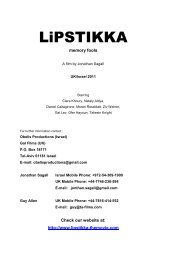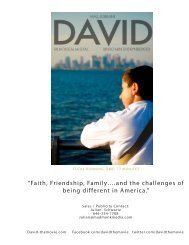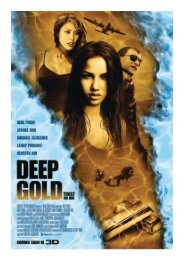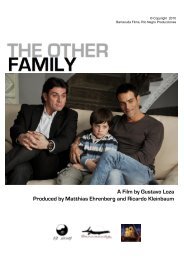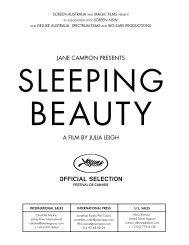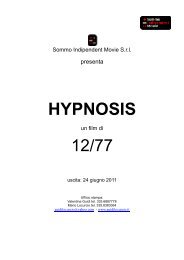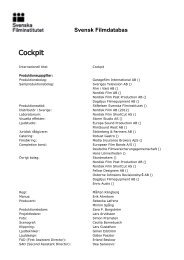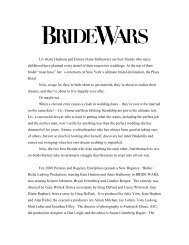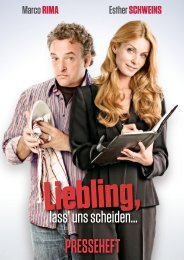A film by Lavinia Currier Based on the memoir by Louis ... - FDb.cz
A film by Lavinia Currier Based on the memoir by Louis ... - FDb.cz
A film by Lavinia Currier Based on the memoir by Louis ... - FDb.cz
Create successful ePaper yourself
Turn your PDF publications into a flip-book with our unique Google optimized e-Paper software.
outside world – “some<strong>on</strong>e to emerge and go to Oxford and become educated and <strong>the</strong>n return to articulate<br />
<strong>the</strong> group’s needs, for example.” But seeing <strong>the</strong>m in fr<strong>on</strong>t of <strong>the</strong> camera changed her perspective: “Given<br />
<strong>the</strong> chance, <strong>the</strong>y were capable of being very forceful, because <strong>the</strong>y were breaking a lot of norms for<br />
<strong>the</strong>mselves in doing <strong>the</strong> <str<strong>on</strong>g>film</str<strong>on</strong>g>. Not just <str<strong>on</strong>g>by</str<strong>on</strong>g> performing, but <str<strong>on</strong>g>by</str<strong>on</strong>g> participating in this new hierarchy. They are<br />
also very individuated, with a broad tolerance for difference, which makes a very interesting ensemble<br />
cast.” She specifically points out seeing <strong>on</strong>e of <strong>the</strong> tribe’s young boys, no more than eight years old, telling<br />
some of <strong>the</strong> older members of <strong>the</strong> cast to be happier, sadder, and show more emoti<strong>on</strong> in <strong>the</strong>ir performances.<br />
But <strong>the</strong> most inspiring member of <strong>the</strong> cast and crew was perhaps British actor Kris Marshall,<br />
playing <strong>the</strong> lead of Larry Whitman. Marshall, a British TV star who would be recognized <str<strong>on</strong>g>by</str<strong>on</strong>g> American<br />
audiences for his role in “Love, Actually,” was already known as a tough customer – he survived a<br />
devastating car accident in 2008 – but what awaited him <strong>on</strong> “OKA!” was unprecedented. “He had<br />
absolutely no c<strong>on</strong>cern for his own well-being,” remembers <str<strong>on</strong>g>Currier</str<strong>on</strong>g>. “Most actors would have g<strong>on</strong>e home<br />
with <strong>the</strong> sickness that he had while we were <str<strong>on</strong>g>film</str<strong>on</strong>g>ing – he had a parasite and <strong>the</strong> threat of dysentery. I told<br />
him he could take sick days to recover, but he said ‘No, this is my job, I want to get it d<strong>on</strong>e.’ He lost fifteen<br />
kilos [over 30 pounds] but just soldiered <strong>on</strong>.” Marshall is also unusual in that he was partially deaf as a<br />
child, and didn’t relate to his character’s desire to capture sound: instead, he immersed himself in learning<br />
<strong>the</strong> language of Akka, and ended up being able to c<strong>on</strong>verse and improvise with <strong>the</strong> Bayaka in a more<br />
natural and engaging manner.<br />
The European and American crew ultimately learned quite a bit about <strong>the</strong>ir subjects. “I had no idea<br />
about <strong>the</strong> Bayaka,” says Jamie Bruce, “but now I understand <strong>the</strong>ir plight is twofold. First, <strong>the</strong>y are forest<br />
people, and if <strong>the</strong> forest is destroyed, <strong>the</strong>y will be destroyed with it – that’s <strong>the</strong> sad reality.<br />
“But <strong>the</strong> positive thing about <strong>the</strong> movie,” adds Bruce, “is that this is not about a white guy coming<br />
to save <strong>the</strong>m – it’s <strong>the</strong> opposite, <strong>the</strong>y save <strong>the</strong> white guy. And that’s what I learned most – <strong>the</strong>y think<br />
differently. They live in <strong>the</strong>ir communities with no formal structure – I think like a scientist, with logic,<br />
proof – and <strong>the</strong>y <str<strong>on</strong>g>by</str<strong>on</strong>g> our standards are living in a surreal world. When Isaach was portraying <strong>the</strong> Mayor,<br />
both <strong>the</strong> Bayaka and <strong>the</strong> Bantu would approach him and say ‘Mr. Mayor, can you do something for us?’ It<br />
was seamless between <strong>the</strong>ir daily life and <strong>the</strong> <str<strong>on</strong>g>film</str<strong>on</strong>g> world – that’s amazing.”<br />
Bruce also admits that he first c<strong>on</strong>sidered <strong>the</strong> <str<strong>on</strong>g>film</str<strong>on</strong>g> a bit more of a comedy – al<strong>on</strong>g <strong>the</strong> lines of “The<br />
Gods Must Be Crazy,” a traditi<strong>on</strong>al “fish-out-of-water” story that plays up<strong>on</strong> <strong>the</strong> clash of cultures to<br />
produce humor. Much of that humor remains, such as in <strong>the</strong> tribe’s c<strong>on</strong>stant nagging of Larry for gifts from<br />
<strong>the</strong> outside world, and <strong>the</strong> stark c<strong>on</strong>trast of Larry’s 6-foot-plus Caucasian frame against <strong>the</strong> backdrop of<br />
dark-skinned tribespeople barely more than five-feet-tall. There is even a “Greek chorus” of three older<br />
tribesmen who comment <strong>on</strong> <strong>the</strong> acti<strong>on</strong>s of Larry while smoking <strong>the</strong>ir pipe, <strong>on</strong>e of <strong>the</strong> <str<strong>on</strong>g>film</str<strong>on</strong>g>’s more notable<br />
examples of ensemble acting that reflects both <strong>the</strong> c<strong>on</strong>structed storyline and <strong>the</strong> au<strong>the</strong>ntic behavior of <strong>the</strong>



